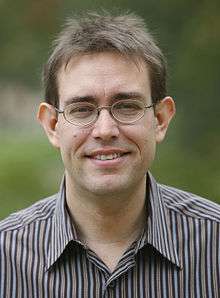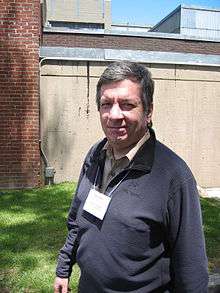International Society for Nanoscale Science, Computation, and Engineering
The International Society for Nanoscale Science, Computation, and Engineering (ISNSCE, pronounced like "essence"[1]) is a scientific society specializing in nanotechnology and DNA computing. It was started in 2004 by Nadrian Seeman, founder of the field of DNA nanotechnology. According to the society, its purpose is "to promote the study of the control of the arrangement of the atoms in matter, examine the principles that lead to such control, to develop tools and methods to increase such control, and to investigate the use of these principles for molecular computation, and for engineering on the finest possible scales."[2][3]
ISNSCE sponsors two academic conferences each year: the first is Foundations of Nanoscience (FNANO), and the second is the International Conference on DNA Computing and Molecular Computation (DNA Computing).[2] The FNANO conference has been held in Snowbird, Utah each year in April since 2004, and focuses on molecular self-assembly of nanoscale materials and devices.[4] DNA Computing focuses on biomolecular computing and DNA nanotechnology, and has been held annually since 1995.[5] The proceedings of DNA Computing are published as part of the Lecture Notes in Computer Science book series.[6]
Awards
ISNSCE sponsors two awards annually. The ISNSCE Nanoscience Prize recognizes research in any area of nanoscience, and has been presented at FNANO each year since 2007. The Tulip Award in DNA Computing is specific to the fields of biomolecular computing and molecular programming, and has been presented at the DNA Computing conference since 2000. ISNSCE also sponsors two student awards for papers presented at the DNA Computing conference each year.[7]
The Tulip Award was first given at the sixth DNA Computing conference, in Leiden, the Netherlands, whose botanical garden is known as the birthplace of the tulip culture in the Netherlands.[8][9]
In April 2015, ISNCSE established the Robert Dirks Molecular Programming Prize to recognize early-career scientists for molecular programming research. The award was established in memory of Dirks, who was one of the six fatalities of the February 2015 Valhalla train crash.[10]
The following are recipients of the ISNSCE Nanoscience Prize:[11]
| Year | Awardee | Institution | |
|---|---|---|---|
| 2008 |  |
George M. Whitesides | Harvard University |
| 2009 |  |
Paul Alivisatos | University of California, Berkeley |
| 2010 | James Fraser Stoddart | Northwestern University | |
| 2011 |  |
Nadrian Seeman | New York University |
| 2012 | Cees Dekker | Delft University of Technology | |
| 2013 | Bartosz Grzybowski | Northwestern University | |
| 2014 | Makoto Fujita | University of Tokyo | |
| 2015 |  |
Paul Rothemund | California Institute of Technology |
The following are recipients of the Tulip Award in DNA Computing:[9][12]
| Year | Awardee | Institution | Rationale | |
|---|---|---|---|---|
| 2000 | Erik Winfree | Caltech | ||
| 2001 | Laura Landweber | Princeton University | ||
| 2002 | Tom Head | Binghamton University | ||
| 2003 | Anne Condon | University of British Columbia | ||
| 2004 |  |
Nadrian C. Seeman | New York University | |
| 2005 | John H. Reif | Duke University | ||
| 2006 |  |
Paul W. K. Rothemund | Caltech | |
| 2007 | Natasha Jonoska | University of South Florida | "for her work in applications of automata and graph theory to DNA assembly" | |
| 2008 | Masami Hagiya | University of Tokyo | "for his important contributions to biomolecular computation" | |
| 2009 | Bernard Yurke | Boise State University, Idaho | "for his important contributions to DNA nanotechnology" | |
| 2010 | Milan Stojanovic | Columbia University | "for his important achievements in molecular computing using aptamers and ribozymes" | |
| 2011 | Andrew Turberfield | University of Oxford | "for his continuous, often pioneering, research contributions (from the early days of DNA computing)" | |
| 2012 |  |
Luca Cardelli | Microsoft Research | "for his research contributions to theory and software for programming biomolecular systems... [which] has provided insight into the computational nature of biomolecular processes, in particular those of strand displacement devices, and has facilitated the design of new software tools." |
| 2013 | Hao Yan | Arizona State University | ||
| Yan Liu | Arizona State University | |||
| 2014 | David Soloveichik | University of California, San Francisco | ||
| 2015 | Lila Kari | University of Western Ontario | ||
See also
- Kavli Prize in Nanoscience
- Foresight Institute Feynman Prize in Nanotechnology
- IEEE Pioneer Award in Nanotechnology
References
- ↑ "Erik Winfree Homepage". Winfree Laboratory, California Institute of Technology. Retrieved 9 February 2012.
- 1 2 "About ISNSCE". International Society for Nanoscale Science, Computation, and Engineering. Retrieved 4 February 2012.
- ↑ "History". International Society for Nanoscale Science, Computation, and Engineering. Retrieved 4 February 2012.
- ↑ "Overview". Duke University. Retrieved 4 February 2012.
- ↑ "International Conference on DNA Computing and Molecular Programming". International Conference on DNA Computing and Molecular Programming. Retrieved 4 February 2012.
- ↑ "Published proceedings". International Conference on DNA Computing and Molecular Programming. Retrieved 4 February 2012.
- ↑ "ISNCSE Awards". International Society for Nanoscale Science, Computation, and Engineering. Retrieved 4 February 2012.
- ↑ "DNA6: Sixth International Meeting on DNA Based Computers". Leiden Center for Natural Computing. Retrieved 4 February 2012.
- 1 2 "List of Award Winners". International Conference on DNA Computing and Molecular Programming. Retrieved 4 February 2012.
- ↑ "Robert Dirks ’00 memorial prize announced". Wabash College. 1 May 2015. Retrieved 5 May 2015.
- ↑ "The Nanoscience Prize". International Society for Nanoscale Science, Computation, and Engineering. Retrieved 4 February 2012.
- ↑ "The Tulip Award in DNA Computing". International Society for Nanoscale Science, Computation, and Engineering. Retrieved 4 February 2012.
External links
- International Society for Nanoscale Science, Computation, and Engineering
- Foundations of Nanoscience conference
- International Conference on DNA Computing and Molecular Programming